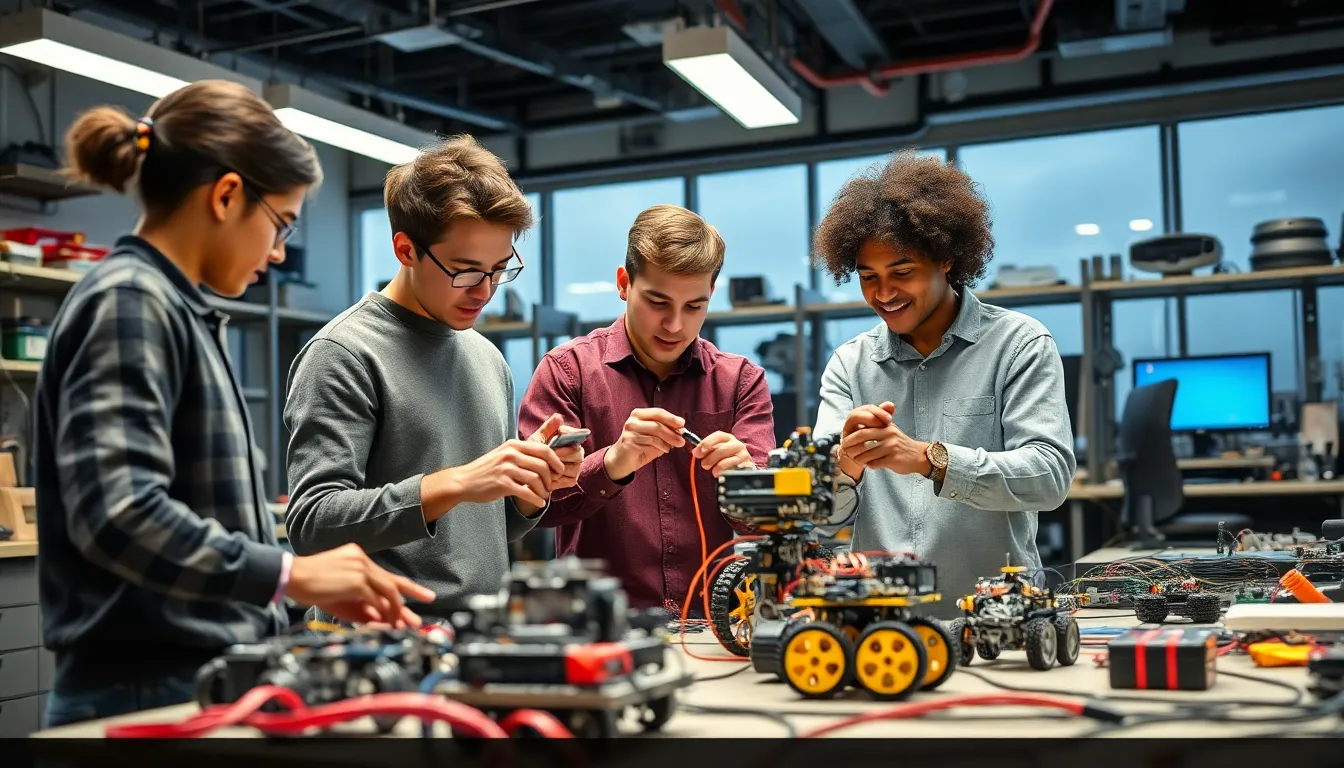Table of Contents
ToggleAt Purdue University, robotics engineering isn’t just about building machines; it’s about creating the future—one robot at a time. Imagine a world where robots can do everything from making your morning coffee to saving the planet. Sounds like a sci-fi movie, right? Well, at Purdue, students are turning that dream into reality with cutting-edge research and innovative projects.
With a curriculum that blends engineering principles with hands-on experience, Purdue’s robotics program equips students with the skills to tackle complex challenges. Whether it’s designing autonomous drones or programming intelligent systems, these future engineers are ready to take on the world—preferably without any robot uprisings. So, if you’re ready to join a community that’s as passionate about robotics as they are about pizza, Purdue might just be the perfect launchpad for your career.
Overview of Purdue Robotics Engineering
Purdue University stands out for its comprehensive approach to robotics engineering. The program integrates core engineering principles with hands-on experiences. Students engage in innovative research and participate in projects that reflect real-world applications. Designing autonomous drones represents just one aspect of their work. Programming intelligent systems showcases their ability to tackle complex challenges.
Courses emphasize not only theoretical knowledge but also practical skills. Faculty members bring extensive industry experience, enhancing the learning environment. Collaboration with peers fosters a community passionate about robotics advancements. Available resources include state-of-the-art labs and dedicated research facilities.
Internship opportunities allow students to gain valuable experience in various sectors. Industry partnerships provide connections that lead to career opportunities. Robotics competitions challenge students to apply their knowledge in dynamic settings. Research initiatives often focus on cutting-edge technologies like artificial intelligence and machine learning.
Students can explore specialized areas such as robotic perception, autonomy, and human-robot interaction. These focus areas prepare graduates to meet the demands of a rapidly evolving field. The Purdue Robotics Engineering program equips students with the skills needed to revolutionize the future of robotics in multiple industries.
Educational Programs

Purdue University offers a diverse range of educational programs in robotics engineering, fostering the next generation of innovators in the field.
Undergraduate Degrees
Undergraduate students can pursue a Bachelor of Science in Robotics Engineering. This program combines engineering principles with a focus on robotics, enabling students to tackle real-world challenges. Coursework covers vital subjects including electronics, control systems, and software development. Hands-on laboratory experiences allow participants to engage in projects such as building robotic prototypes. Students can actively join clubs and competitions to enrich their learning and develop practical skills.
Graduate Degrees
Graduate degrees include a Master of Science in Robotics and a Ph.D. in Robotics Engineering. Each program delves deeper into advanced topics such as machine learning and robotic systems design. Students engage in cutting-edge research projects, often collaborating with faculty on innovative solutions. Access to modern labs and state-of-the-art equipment enhances their learning experience. Specialized courses allow individuals to explore areas like robotic perception and artificial intelligence, preparing them for leadership roles in the industry.
Research Opportunities
Purdue University offers extensive research opportunities in robotics engineering, allowing students to engage in transformative projects. Students can collaborate with faculty, enhancing their education through practical experiences.
Key Research Areas
Robotics engineering research at Purdue covers various key areas. Advanced robotics focuses on machine learning applications. Autonomous systems research seeks to enhance navigation and decision-making capabilities. Human-robot interaction emphasizes creating intuitive and effective communication between robots and users. Robotic perception explores improving sensory processing in machines. These areas reflect a commitment to pushing the boundaries of technology.
Notable Research Projects
Purdue hosts several notable research projects in robotics engineering. The Robot Assisted Therapy project aims to integrate robotics in therapeutic settings to support patient recovery. Another innovative initiative, the Autonomous Drone Delivery system, works towards creating efficient delivery networks using drones. Additionally, the Smart Manufacturing Research project seeks to optimize production processes with robotic automation. These projects illustrate Purdue’s focus on real-world applications and collaboration with industry partners.
Student Organizations and Competitions
Purdue University hosts an array of student organizations and competitions in robotics engineering, fostering collaboration and innovation among students.
Robotics Club
The Robotics Club at Purdue encourages students to explore robotics outside the classroom. Members engage in hands-on projects, sharing knowledge and skills related to various robotics disciplines. Teams work together on building and programming robots, gaining practical experiences. Club activities include regular meetings, workshops, and guest lectures from industry professionals. This environment cultivates a passion for robotics and helps develop technical abilities essential for future careers. Networking with peers enhances personal growth, facilitating connections in the robotics community.
Competitions and Events
Purdue students participate in numerous robotics competitions and events throughout the academic year. These events, such as the annual Purdue Grand Prix and the Robotic Competition at the Association for Unmanned Vehicle Systems International conference, challenge students to apply their knowledge and skills in real-time scenarios. Teams often design, build, and program robots to perform specific tasks, emphasizing creativity and technical expertise. Winning awards in these contests can significantly enhance a student’s resume. Furthermore, these competitions promote teamwork and strategic thinking, preparing students for future challenges in the robotics field.
Industry Partnerships
Purdue University collaborates with various industries to enhance the robotics engineering curriculum and provide students with invaluable real-world experience. These partnerships connect students with leading companies such as Rolls-Royce, Caterpillar, and Siemens, facilitating internships that offer critical insights into the workings of advanced robotics applications.
Industry engagements feature collaborative research projects that focus on solving contemporary engineering challenges, uniting academic theory with practical implementation. Graduate students often participate in these initiatives, gaining exposure to real-world problems while contributing innovative solutions.
Industry advisory boards play a significant role in shaping the curriculum, ensuring that students acquire relevant skills needed in today’s job market. Frequent feedback from industry partners helps keep educational programs aligned with technological advancements and emerging trends in robotics engineering.
Students gain unique learning opportunities through hackathons and competitions sponsored by industry partners. Events like these encourage teamwork, creativity, and the application of engineering principles in high-pressure environments, mirroring the fast-paced nature of the tech industry.
Partnerships also extend to joint research funding, allowing Purdue to explore cutting-edge technologies. Areas of focus include artificial intelligence applications in robotics and the development of autonomous systems capable of navigating complex environments.
Networking opportunities arise from these collaborations, where students meet professionals and gain insights into career paths within the robotics field. Such interactions often lead to job offers and long-term professional relationships, which greatly benefit graduates entering the workforce.
Through a mix of internships, research initiatives, and competitions fostered by industry partnerships, Purdue prepares students for successful careers in robotics. This emphasis on collaboration with industry leaders underscores its commitment to educational excellence and innovation in robotics engineering.
Purdue University’s robotics engineering program stands out for its innovative curriculum and hands-on experiences. By blending theoretical knowledge with practical applications students are well-prepared for the challenges of the robotics industry. The program’s strong emphasis on collaboration and research fosters a vibrant community that pushes the boundaries of technology.
With industry partnerships and opportunities for real-world experience students gain invaluable insights that enhance their career prospects. As robotics continues to evolve Purdue remains committed to shaping the future of this dynamic field, equipping students with the skills and knowledge necessary to thrive in a rapidly changing landscape.






